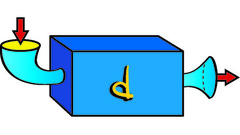In this post, I will be comparing and contrasting my (early) experience of two Calculus Courses I am currently taking (both of which are offered by Coursera)
 |
The most starred at slide while attepting the HWs as well as studying for the first Exam/Quiz
Source: Robert Ghrist's Coursera Course - chapter 1 Lecture 5 |
This of-course, is not a "VS" post. Rather, it is about what each course offers and how both courses complement one another. OK, off we go!
First off, I want to say one thing about Jim Fowler; The Guy has amazing energy (which does not show in the youtube intro video), but it shows in every video lecture of the course.
The course assumes that the student has no prior exposure to Calculus (and even if you do it cements your Understanding of calculus as well as explain why things are the way they are). The course takes a very hands on approach (concrete examples rather than abstract explanations). The videos show the Instructor explaining the concepts as well as the use of paper, animation (uses a knob to change numbers, you have to see it to know what I mean, just amazing) and black board. In addition, the use of the outdoors to show how Calculus concepts are applied.
the course is structured into weeks; after finishing a week, the student goes to practice what they have learned. The practice problems take place in a platform, that they developed, called
mooculus. The practice problems , as they put it, "more like a fun interactive textbook", which is true (the platform is simply
amazing). They help understand concepts as well as cover things the lecturer did not cover. The practice problems are not graded so you can make as many mistakes as you possibly can, or until you "get it".
The following is the course week-by-week plan:
Week One: Limits (1 hour 43 minutes split into 13 video segments, watched at a speed of 1.6x)
Week Two: Infinity and Continuity (1 hour 10 minutes split into 15 video segments)
Week Three: The Derivative
Week Four: Techniques of Differentiation
Week Five: The Chain Rule
Week Six: Derivatives of Transcendental Functions
Week Seven: Applications of Derivatives
Week Eight: Optimization
Week Nine: Linear Approximation
Week Ten: Antidifferentiation
Week Eleven: Integration
Week Twelve: Fundamental Theorem of Calculus
Week Thirteen: Techniques of Integration
Week Fourteen: The Substitution Rule
Week Fifteen: Volume
Thus far, I have completed week one and week two (which covered functions and Limits - the corner stone of calculus) as well as the the mooculus practice problems for those weeks (which are ungraded) and the "end of week" Quizzes (which are part of the grade). for each Quiz you get unlimited (or rather 100) chances to solve the problems. It seems that the course is more concerned about the student learning rather than assessing (with so many tries, you are bound to get the correct answers). Thus, the approach of the course is more relaxed than Calculus: Single variable (which is coming up next).

First off; I have to say that the course material is very "beautiful" (I can't think of another word to describe it). As one student suggested in the forum, the course should have been called "The art of Calculus". The presentation of the subject matter is just amazing (beautiful art, great animation, and the right choice of colors). I especially liked how the definition of a limit was described via animation (Lecture 7 at 1:45).
Here is Robert Ghrist brief explanation of the process (taken from the forum) :
"well...the course is still being drawn (i am done with nearly 70% of the lectures). if you like chapter 1, wait till you see chapter 4 ;-)
this summer, i made a drawing/recording studio in my home office. it has a stand-up desk with audio foam enclosure, a yeti mic, a wacom tablet, sony vaio laptop, and a dell monitor.
it takes about 20 hours (!) per 15-minute lecture... that's 3 hours : design 7 hours : drawing 6 hours : animation 1 hour : video recording 1 hour : audio recording 1 hour : video/audio processing 1 hour : uploading, checking
let's see, we have 60 lectures for the course. that's ~1200 hours. please keep this in mind when you ask me to do multi-variable ;-) no matter how hard you find this course to be, know that i have worked and will work just as hard as you to make sure you get the best lectures i can make...
prof/g"
The course is not easy (I wrote this post AFTER completing the first quiz), it assumes that you have previous exposure to Calculus; you have to already know derivatives and integrals (but that is not the hard part). The hard part is the assessment at the end of the section; You have only one try and, according to the honor code, you are not allowed to use any outside help (not even a calculator), all you can use is writing material and paper. I was stressed about that so after watching the chapter 1 lectures the first time round (at a speed of 1.4x) I re-watched everything for chapter 1 (at 2.0x speed).
the Course is split into chapters (as opposed to weeks). The way I did it was watch one lecture then do the ungraded practice hw (which were very involved so it was 1 lecture per day then the ungraded homework until the whole chapter was done). After the completion of the chapter, I took the quiz (after a lot of studying and memorizing the Taylor series for the known functions - I ended up deriving one of them since I am really bad at memorizing ). I still don't get the closed-book/closed-note in a MOOC, but since the honor code states it then I wanted a proper assessment (and thus, I did not break it, I would only be cheating myself if I did).
As I stated earlier. The course is split into chapters:
CHAPTER 1: Functions (2 hours 45 minutes split into 13 video segments)CHAPTER 2: DifferentiationCHAPTER 3: IntegrationCHAPTER 4: ApplicationsCHAPTER 5: Discretization
In "Calculusion"
Both courses are great; my only concern is with the assessment part (too harsh in Calculus: Single Variable, and too lenient in Calculus one.. but that's just me). Other than that, I have NO preference one over the other, in-fact, each one covers somethings different as well as somethings differently (i.e. from a different angle) and they complement one another.
So hopefully, I will try to complete both :)





